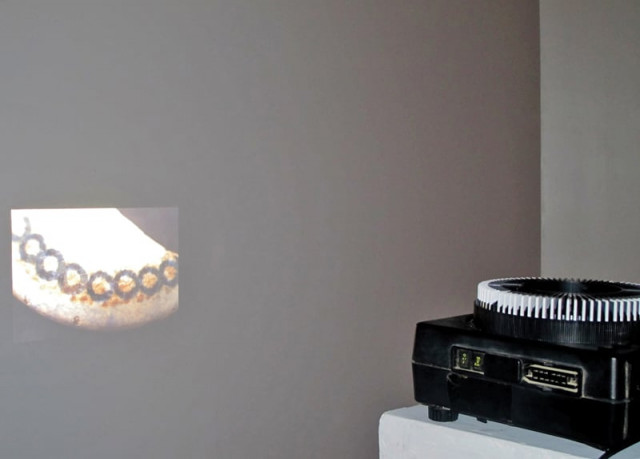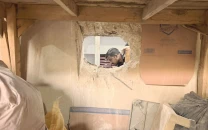Putting together fragments of history
Yaminay Chaudhri holds a discussion with the artists and curator of 'Tracing the Void'.

Sonya Schonberger and Sajjad Ahmed’s artwork examines the relationship between past and present. PHOTO: COURTESY IVS GALLERY
History and its relationship with the present is what inspired both the artists of 'Tracing the Void'. However, it is the curatorial judgement and efforts of curator Hajra Haider whose result was the bringing together of the two artists - German artist Sonya Schonberger and Lahore-based artist Sajjad Ahmed - on one platform.
According to Haider, she brought the two together because of the indirect connections that Germany and Pakistan share. "It's the burdens we carry," she said. "Burdens of events we didn't even witness. For us, it was the effects of Partition and colonialism. We were born much later but it still affects us."

Schonberger and Ahmed, who are displaying their works at the Indus Valley School (IVS) gallery till today (February 10), were speaking on the third day of the sixth Karachi Literature Festival on Sunday. They were accompanied by Haider and Yaminay Chaudhri.
Distortion of history was also brought up in the insightful discussion. "History is always perspective," said Haider. "It's about how the person, who is talking to you, sees it. We hear stories of the past from our parents. Even those stories that our parents were not actually there to witness. May be it's a story that they heard from their parents, and they, from theirs. It's the fragments of history that you remember and put together."
Ahmed added a good point to support Haider's view. "History is residue," he said. "It's the fragments that reach us about an event that took place earlier."
Schonberger, who, besides being an artist, has an interest in anthropology, also talked about the importance of the 'stories told'. "If I want to understand my present, I have to look back in my past," she said. She then went on to explain how she explored the museums of Berlin to find the 'hidden treasures' of the Second World War. "People forgot what lies under the area that they walk on."
It was there that she collected about 2,000 fragments of household items made of porcelain, ceramic and glass. At the exhibition at IVS gallery, one of her artworks is a video of a man named Michael who talks about the collected items and explains what they were used for.
Both artists had a lot to say about history and how it is different for each individual. According to Schonberger, she spoke to a number of people in Berlin to hear their stories of war. "People just say that 'Oh, my story is just about everyday life and irrelevant'. But every story has some unique experience."
Talking about how history is passed on to generations, she was of the view that we must speak to people who saw the war, or any event for that matter, to hear their stories and capture our own experiences. "The stories I heard about Partition were quite similar to the ones I had heard about World War II."
Ahmed proposed that with history, we only come across residue. According to him, there is a fine line between an actual event that took place and the information we receive about it. "Information is only residue that is passed on to us."
Wrapping up the two artists' insightful discourse, Haider suggested that narratives are relational. "It's not just about Germany or Pakistan," she said. "It's the story of an individual."
The lesser known curator
Visual artist Chaudhri, who was moderating the session, asked Haider about what she had to say about her role in the exhibition. Haider's reply was insightful and encouraging.
"People think that a curator's job is just to hang the artworks in the right places," she said. "Actually, there is a lot more than that."
She went on to explain how her work is to put together the works of two or more artists under a theme. "It's like putting pieces back into the puzzle."
Published in The Express Tribune, February 10th, 2015.



















COMMENTS
Comments are moderated and generally will be posted if they are on-topic and not abusive.
For more information, please see our Comments FAQ